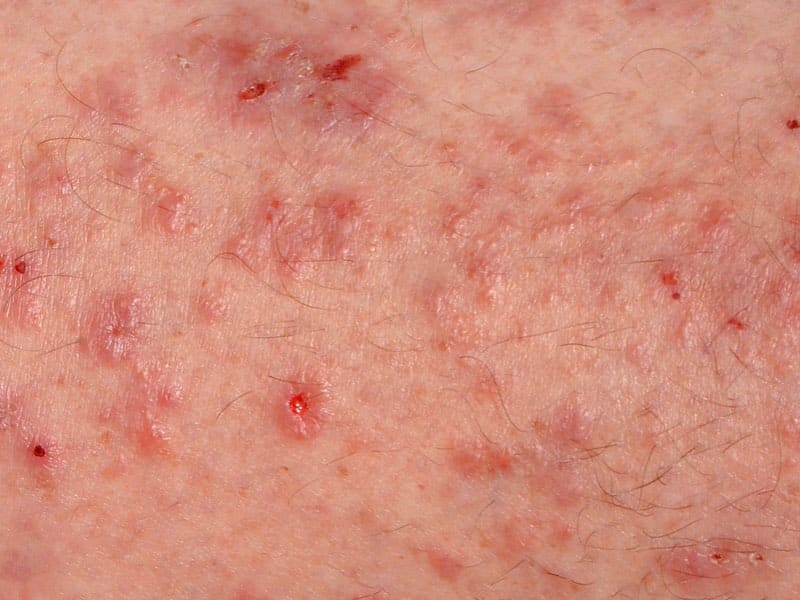Scabies (Mange)
Scabies (Mange)
Book Now
Scabies (Mange)
Scabies is a highly contagious parasitic skin condition characterized by itching and rash, commonly seen in crowded living environments, especially during the winter months. The disease is caused by the Sarcoptes scabiei hominis mite, and it can affect individuals of all genders, ages, and races. The itching, which intensifies at night, leads to rashes and can result in severe skin lesions. Scabies is contagious from human to human but does not spread from animals to humans. Human-to-human transmission occurs through sexual contact, close contact in communal living spaces, or indirect contact with personal belongings (such as clothes or bedding) of an infected person.
What are the Symptoms of Scabies?
The most prominent symptom is intense itching, which worsens at night and in warmer environments. The affected areas of the body typically include the spaces between the fingers, the inside of the wrists, the armpits, buttocks, the areolas in women, and the genital area in men. In adults, the back, face, and scalp are generally unaffected, though in infants, these areas may also be involved. The classic skin lesion of scabies is a grayish-white, 1-10 mm long tunnel, typically found between the fingers, where the mite burrows. Other skin manifestations include small bumps, hard nodules, fluid-filled blisters, and scaly, crusted lesions.
Treatment of Scabies
The most important aspect of effective scabies treatment is patient adherence to the prescribed treatment regimen. The usual treatment involves the application of antiparasitic creams, such as permethrin, phenothrin, sulfur, benzyl benzoate, crotamiton, ivermectin, or malathion. Oral ivermectin may also be used in more severe cases. Clinical studies suggest that the treatment efficacy is similar across different medications; however, the success of treatment primarily depends on the patient’s adherence. When planning treatment for scabies, it is essential that all individuals living with the patient, even those without symptoms, also undergo treatment to prevent reinfection.
Important Considerations in Scabies Treatment
-
Pre-treatment hygiene: Before applying the treatment, the patient should take a shower and apply the cream to the entire body, including the neck and behind the ears. It is essential not to forget areas such as the spaces between the fingers, the navel, and the groin.
-
In vulnerable individuals: In infants, immunocompromised individuals, or adults with lesions on the scalp, special care should be taken to protect the eyes and mouth while ensuring that the scalp is also treated.
-
Treating close contacts: Family members or individuals in close contact with the patient should undergo treatment, even if they show no symptoms.
-
Breastfeeding: During breastfeeding, it is recommended to refrain from nursing for up to five days after treatment.
-
Cleaning of personal items: After treatment, all clothing, towels, and bed linens should be washed thoroughly. Items that cannot be washed should be sealed in a plastic bag for seven days or frozen at temperatures between -10 to -18°C for five hours to kill the mites.
-
Recurrent or severe cases: In cases of crusted scabies, widespread scabies with multiple tunnel-nodule lesions, immunocompromised patients, epidemic situations, or patients with poor treatment compliance, repeated treatment protocols may be necessary.
-
Post-treatment itching: Itching may continue even after treatment due to allergic reactions to the mites or their secretions.
-
Isolation of the patient: Except for crusted scabies, there is no need to isolate the patient.
-
Drug resistance: In cases where new lesions develop despite repeated treatment, drug resistance may be suspected. However, this is usually due to improper application of the medication or continued contact with infected individuals.
Conclusion
To prevent complications and ensure successful treatment, it is highly beneficial to consult with a healthcare professional. Timely treatment and strict adherence to the prescribed regimen can help avoid complications and reinfection.
Make an Appointment
The best way to enjoy a treatment at our salon is to book an appointment with the desired esthetician. Fill in the form below and we will contact you to discuss your appointment.